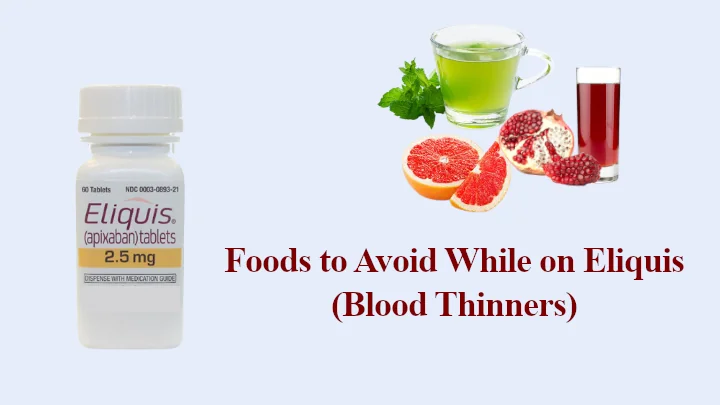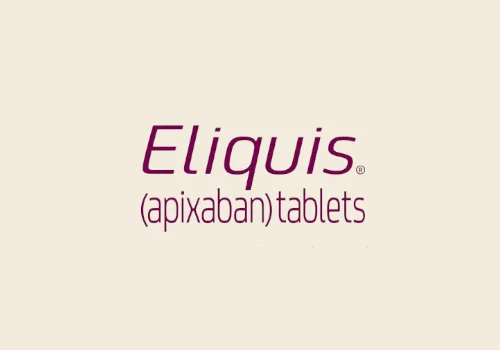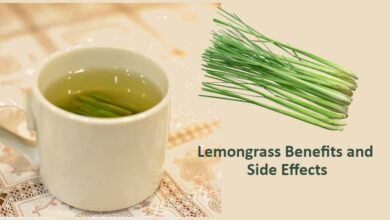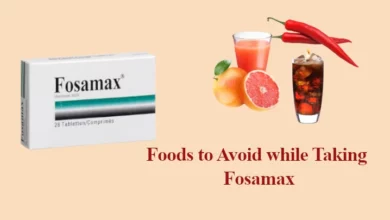What Foods to Avoid While on Eliquis (Blood Thinners)

Looking for what foods to avoid while on Eliquis. I’m letting you know about something important regarding managing your health – certain medications require extra consideration regarding dietary choices. Eliquis is a commonly prescribed blood thinner, and while no specific foods must be eliminated from your diet while taking this medication, it’s still important to pay attention to what you eat for the medication to work effectively and avoid any potential interactions or complications. So keep this in mind if you ever take Eliquis!
In this post, we’ll look at what foods to avoid while on Eliquis and suggestions to help you manage your diet while taking Eliquis.
In This Article
What Foods to Avoid while on Eliquis
We have listed what foods interfere with eliquis?

1. Grapefruit
Foods not to eat while taking eliquis are Grapefruit and grapefruit juice. It can interact with many medications, including Eliquis. Grapefruits contain compounds called furanocoumarins which inhibit an enzyme in the liver called CYP3A4.
This enzyme metabolises certain drugs like apixaban (the active ingredient in Eliquis). So be sure to check eating or drinking anything containing grapefruit if you take any medication!
2. Pomegranate Juice
Pomegranate juice can affect the metabolism of certain medications, including Eliquis (apixaban). It’s true! Compounds called polyphenols in the juice can inhibit enzymes in your liver responsible for breaking down drugs.
This interaction could lead to higher levels of Eliquis in your bloodstream and increase your risk of bleeding. So be aware if you’re taking this medication and drinking pomegranate juice simultaneously!
3. Cranberry Juice
Drinking cranberry juice while taking Eliquis (apixaban) should be avoided. This is because cranberries contain specific compounds called flavonoids, which may inhibit an enzyme in the liver called CYP3A4.
This enzyme is responsible for metabolizing Eliquis; if inhibited, it could lead to adverse effects. So please make sure to talk with your doctor before consuming any cranberry product while on this medication!
4. High-Dose Vitamin E
Vitamin E has blood-thinning properties, and when taken in large doses, it can increase your risk of bleeding.
This is especially concerning when combined with Eliquis, an anticoagulant medication that helps prevent clotting.
5. Omega-3 fatty Acids
While fish oil and omega-3 supplements are generally beneficial, they can have anticoagulant effects. Therefore if you’re taking eliquis, it’s best to avoid these supplements as a precautionary measure.
It’s always good to be aware of any potential interactions between medications and dietary supplements, so please keep this in mind!
6. Alcohol
It’s essential to know the potential risks of taking Eliquis (apixaban) and drinking alcohol. While both can increase your risk of bleeding, combining them could have an even more significant effect.
Be mindful that excessive alcohol consumption can stress the liver and interfere with how Eliquis is metabolized in your body, which may lead to unwanted side effects.
7. Green Tea
Green tea contains vitamin K, which is known to promote blood clotting. On the other hand, Eliquis is an anticoagulant medication that works by inhibiting the clotting process in the body.
So if you are taking Eliquis for any reason, it’s essential to be aware that consuming foods or beverages high in vitamin K can counteract its effects and potentially reduce its effectiveness in preventing blood clots.
8. Licorice
It’s best to avoid or consume licorice with caution. Licorice root and candies containing licorice contain a compound called glycyrrhizin, which can interact with the medication and increase your risk of bleeding. So it’s better to be safe than sorry.
9. Spinach
Spinach is indeed high in vitamin K, and if you’re taking Eliquis (apixaban), you should avoid eating spinach. The key to foods rich in vitamin K, including spinach, is to maintain a consistent intake because Vitamin K is essential in blood clotting. Sudden changes can affect the effectiveness of anticoagulant medications like Eliquis, so make sure to keep your diet steady!
10. Caffeine
Eliquis is a blood thinner prescribed to individuals with cardiovascular conditions. While the stimulant effects of caffeine may seem beneficial in small doses, if your heart rate increases too much while taking Eliquis, it could lead to an increased risk of bleeding or other complications.
Additionally, excessive consumption of caffeinated beverages can contribute to dehydration which could further increase the risk of taking this medication. So stay hydrated and keep your caffeine intake at moderate levels if you’re on Eliquis!
11. High-Sodium Foods
It’s important to remember that high-sodium foods can lead to an increase in blood pressure. Maintaining healthy blood pressure levels is especially important for individuals taking blood thinners as it reduces the risk of cardiovascular complications.
Additionally, a high-sodium diet can cause fluid retention leading to swelling in our extremities and discomfort, which could exacerbate any underlying conditions.
12. Processed Foods
It’s essential to be mindful of what you eat when taking Eliquis or any other medication. While there isn’t a direct interaction between processed foods and the medication, avoiding or limiting them in your diet is generally recommended for overall health benefits.
Processed foods are often high in unhealthy fats that can cause inflammation and negatively impact cardiovascular health.
13. Sugary Snacks and Beverages
We all know that eating a balanced diet is essential for our health. But did you know that high sugar intake can have serious consequences? Studies show that too much-added sugar in your diet can lead to obesity, type 2 diabetes, heart disease and dental problems.
It’s also been linked to increased inflammation levels which could be dangerous if you take blood thinners. So let’s keep our diets in check by limiting added sugars and maintaining a healthy balance!
Q. Can I eat broccoli while taking Eliquis?
Ans- Yes, you can eat broccoli while taking Eliquis. While broccoli is rich in vitamin K, which plays a role in blood clotting, it does not need to be completely avoided. Your healthcare provider will consider your overall vitamin K intake and ensure you receive the appropriate dose of Eliquis to maintain its effectiveness.
Q. Eliquis and lemon juice: Eliquis food restrictions with Lemon?
Ans- There are no specific interactions between Eliquis (apixaban) and lemon juice. Therefore, it is generally safe to consume lemon juice while taking Eliquis. Lemon juice is a natural source of vitamin C and can be a refreshing addition to your diet.
Conclusion
In conclusion, being mindful of your diet while taking Eliquis or any other blood thinner medication is essential. Although there are no specific foods you need to avoid entirely, it’s advisable to keep a few key points in mind for the medication’s effectiveness and overall health.
References
- Role of Apixaban (Eliquis) in the Treatment And Prevention of Thromboembolic Disease
- Quick reference guide to apixaban ( Eliquis)
- Food–Drug Interaction and their clinical implications





